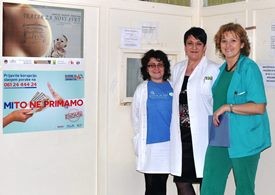
December 2016—Whether waiting in a frantic emergency room after an accident, or at a routine medical check-up, patients everywhere look for relief, understanding and timely assistance from their doctors. Serbia is no different. However, Serbia’s health care system suffers from underfunding, poor management, and a high public perception of corruption.
Despite the views on corruption, one thing seems clear—when a loved one’s health is at stake, most people will do whatever it takes, even if a few lines are blurred in the process. Patients and family members may offer bribes for preferential treatment, or vice versa—doctors and medical staff may solicit bribes to schedule specific exams or surgeries.
Non-transparent practices by hospitals and poor understanding of hospital management have led to negative connotations of the medical profession. To reverse this, USAID’s Judicial Reform and Government Accountability project teamed up with NGO Serbia on the Move (SoM) in 2013 to equip citizens and medical staff with the knowledge and means to make informed decisions about medical care, promote integrity, and understand how corruption erodes the quality of health care.
SoM is dedicated to fighting corruption in health care and improving the quality of patient services. The NGO’s projects include: “I’m not on the take, I work for a salary” (700 medical doctors wore a badge with that statement and signed a personal statement of incorruptibility); “Young journalists in action: Voice for Health!” (develops investigative journalism stories that inform citizens on corruption in health care); and the Kakav je doctor (“What’s Your Doctor Like?”) portal where citizens can post comments on the quality of service provided by specific doctors.
SoM also manages an SMS service supported by the Ministry of Health and the United Nations Development Program for reporting corruption in the health care sector. To date, the service has received 1,000 reports that have resulted in 15 filed criminal charges.
In August 2013, with USAID financial and technical support, SoM launched the Zero Tolerance for Corruption Project, which works in five medical institutions in Sremska Kamenica, Vršac, Kraljevo, Zemun and Vrnjačka Banja. Under the project, anti-corruption workshops accredited by the Continuous Medical Education program of the Health Council of Serbia educated 452 doctors from the participating hospitals. To ensure continuation of the workshops, which focused on personal integrity and work ethics rather than law and punishment, future trainers received instruction between December 2013 and March 2014.
“As many doctors and health care institutions as possible should be involved in this. A rare chance to hear the details about this very important topic,” said a doctor working in the Vršac General Hospital after attending one of the workshops.
“Turning initial resistance into positive energy and drive for change was the most challenging aspect of the workshops. Opening a dialogue with the medical staff is important for fighting corruption bottom to top,” said Predrag Stojičić, project coordinator.
SoM also trained more than 800 citizens in five cities on corruption in the health care system and how to fight it. Their successful community organizing led to citizen inclusion on the boards of five health institutions. SoM’s awareness-raising activities have resulted in almost 1,000 citizens participating in local actions and 4,500 citizens participating in online campaigns to further increase public awareness about corruption in Serbia’s health care system.
In October 2015, SoM’s advocacy efforts led to publication of the List of Licensed Medical Practitioners on the Serbian Medical Chamber’s website. Previously, citizens didn’t have access to information about licensed doctors practicing in private offices or public health care institutions. Publication of the list is expected to provide citizens with higher quality health services as well as improve Serbia’s ranking on the Euro Health Consumer Index, where it holds an unenviable 30th position for its health care system.
“One of our goals has been achieved, but we will continue to work toward greater transparency and less corruption by finding ways to inform citizens about whether a doctor has lost his/her license because of a conviction for accepting a bribe or for medical error,” said Nataša Čorbić, SoM’s executive director.
In partnership with USAID, Serbia on the Move is working toward eliminating corruption in health care. The Judicial Reform and Government Accountability Project ended in November 2016.
LINKS
Follow @USAIDSerbia, on Facebook, on YouTube







Comment
Make a general inquiry or suggest an improvement.